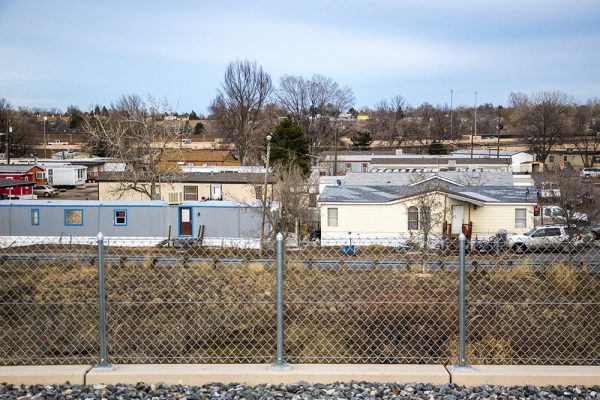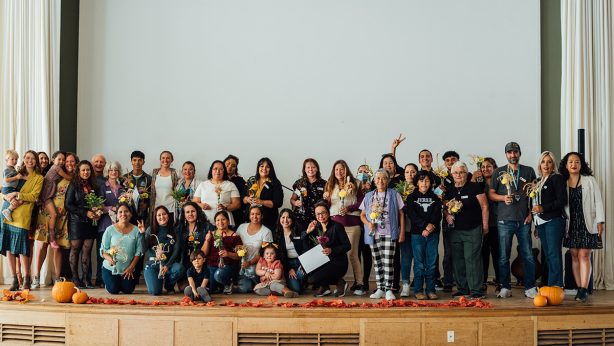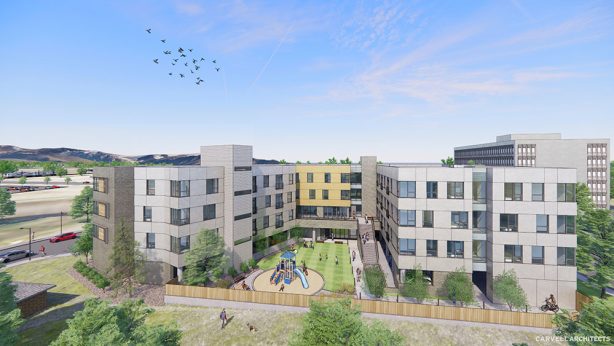RedLine Gallery Hosts “Right to Housing Summit”
The following is an article written by Clayton Vye, ULC’s Communications Intern. Vye attended a portion of Redline’s “Right to Housing Summit” on February 2nd. To learn more about the entirety of the 4 hour event, click here.
Surrounded by community art as he stood in front of a passionate crowd, Steve Diaz spoke to the audience during the Right to Housing Summit at the Redline Arts Gallery in RiNo earlier this month.
“There’s this idea that housing is being created and that people are being taken off the streets,” Diaz announced. “The reality is the city is creating criminalization and continuing to enact policies that criminalize house-less folks.”
Diaz is a community organizer with the Los Angeles Community Action Network (LA CAN), a community organization based in Los Angeles helping individuals struggling with poverty and homelessness. Diaz visited Denver to share his city’s story, and to explain the community organizing, policy initiatives and legal strategies underway in Los Angeles County.
Diaz also spoke to the City of Los Angeles’ deep history with laws geared towards criminalizing poverty. Quality of Life Crimes in particular are pointedly used towards the poor.
“Most of the Quality of Life Crimes that were happening, were actually folks that were crossing the street from one side to another and the walk sign was on when they started and in the middle of the crosswalk the hand started blinking,” explained Diaz. “That’s actually a quality of life offense in Los Angeles.”
These types of offenses are primarily targeted at homeless individuals and low-income residents living in communities where property values are increasing. The criminalization of homelessness in L.A. occurs at a rate of an estimated 50 arrests per day. Diaz explained that this number will likely increase as rents rise, wages remain stagnant and more people move to Los Angeles.
Diaz’s first project was as part of LA CAN’s Residential Hotel Unit Conversion and Demolition Ordinance (RHO). After city council passed the ordinance, it immediately protected 19,000 residential hotel and apartment units from demolition. Residential hotels are buildings with six or more guestrooms and are often the last hope for very low-income residents. RHO protected many of these hotels from being demolished, which would have displaced tens of thousands of residents. Diaz explained that in his experience with passing RHO, organizing was primarily accomplished street by street and block by block, rather than as a City initiated policy.
Another project Diaz worked on was Proposition HHH, a $1.2 billion supportive housing loan program passed by voters in 2016. As of late 2018, the landmark program funded 2,788 units of affordable housing with 15 additional developments proposed.
Despite the increased city funding to build homes for low income residents, Diaz noted that homelessness in Los Angeles is on the rise. Diaz attributes a portion of this to the composition of the task force in charge of Prop HHH. It was stipulated in the proposal that “directly impacted people” were supposed to be a part of the task force, yet Diaz stated that not one single person in charge of Proposition HHH had any direct experience with homelessness.
The housing issues that Diaz discussed in Los Angeles strongly resonated with Redline’s Denver audience. The city’s camping ban and police harassment of homeless individuals in Denver was all too reminiscent of L.A.’s experience. How then, can Denver fight the continuous cycle of poverty and criminalization that keeps people in a perpetual phase of homelessness? Diaz suggested multiple strategies: increased civic engagement to elect individuals with actual experience being homelessness, street watch organizations to document and share the practices of the police and community education to keep the public informed.
Following the event’s keynote speaker, the audience heard from an Aurora resident on the cusp of homelessness. Matilda Macías is a resident of Denver Meadows, a mobile home park in Aurora. Mrs. Macías is a single mother of four children who has lived in Denver Meadows for 12 years.
“I work really hard and once I paid it (her trailer) off, I felt proud because it was mine,” Macias said. Despite many residents owning their mobile homes, in 2016 it was made known that the owner of Denver Meadows planned to rezone his property and sell it to developers. Denver Meadows residents banded together and took the dispute to the City of Aurora. The residents were temporarily successful, winning a 10-month moratorium on the mobile home park redevelopment. However, the moratorium is set to expire next month.

Urban Land Conservancy’s Director Real Estate, Mark Marshall sits on the Aurora Mobile Home Task Force. The task force is charged with recommending tools to preserve existing mobile home communities when possible, and when not possible, seeking to provide fair and equitable relocation assistance for mobile home residents faced with displacement. With the Aurora moratorium on the rezoning of mobile home communities scheduled to expire on March 20th, mobile home community owners will be able to sell their property to developers who would then rezone the land for higher density redevelopments. There are currently 12 mobile home communities consisting of more than 2,500 mobile homes within 1 mile of the Colfax R Line RTD station – making them prime candidates for redevelopment.
According to Marshall, Denver Meadows once had over 400 mobile homeowners on the site. This number has dwindled to less than 30. With the understanding that Denver Meadows will be sold and developed, the City of Aurora is currently working with the homeowners to provide a fair relocation package. Some residents have relocated, others are fearful that their relocation assistance will not be enough to successfully move their homes in the timeframe in which they will be required to do so.
ULC is acutely aware of the pressing issues low-income individuals face on a daily basis throughout the Metro region. As a strong supporter of Beloved Community Tiny Home Village (Colorado’s first tiny home village for individuals experiencing homelessness), and a member of the Aurora Mobile Home Task Force, we want to be a part of the solution that proactively addresses homelessness in the Denver region. We believe the Right to Housing Summit provided a much needed platform for Denverites to come together and hear from not only our neighbors, but cities across the U.S. struggling with similar issues. If you would like to learn more about the Summit, visit the link here.



